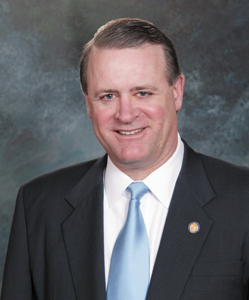STRAIGHT FROM THE SENATE
 WHAT IF ELECTRIC RATES RISE 79%?
WHAT IF ELECTRIC RATES RISE 79%?
WOULD YOU THEN OPPOSE THE FEDERAL CAP-AND-TRADE BILL?
STATEHOUSE – Imagine opening next month’s electric bill to find your rates have risen by 79 percent or pulling up to the fuel pump to find the cost of gasoline has doubled.
Would you complain to your elected officials?
If so, you may want to contact Sens. Evan Bayh and Dick Lugar sooner rather than later.
Currently in Washington, D.C., a debate on a proposal that will have such a devastating impact on Indiana’s economy is underway. In a perhaps well intended, but poorly conceived effort to reduce greenhouse gasses, Congress is poised to cap carbon emissions by fossil fuel users, particularly power plants. If approved, utility companies emitting more CO2 than permitted would be forced to buy or trade for allowances on the open market. For Indiana, which relies on coal-fired plants to produce 96 percent of our electricity, the impact of so-called cap and trade legislation will be felt in lost jobs, reduced global competitiveness and skyrocketing electric rates.
While there may be a growing consensus about global warming, its causes remain the subject of spirited debate and the environmental impact of a unilateral move by the United States is questionable. Many proponents of the plan point to carbon taxes imposed in Europe as a model for the U.S. to follow. The European experience has been incomplete at best. The United Kingdom is facing energy shortages; Germany, which has some of the highest energy costs in Europe, is eyeing nuclear power; and France’s carbon tax has limited impact, since 80 percent of its power is already nuclear.
What has been conclusively proved is that the current U.S. Senate proposal will hit Hoosiers squarely in the wallet, and will do so disproportionately harder than in most other states. Independent assessments by the Heritage Center for Data Analysis evaluated the negative impacts of cap and trade on congressional districts. Among the 435 congressional districts nationwide, they identified eight of the 20 hardest hit are in Indiana. The 4th Congressional District, which includes Lafayette, is projected to be the 14th hardest hit, and the 2nd Congressional District, which includes Delphi, is the second most negatively impacted district in America.
Diverse sources including the U.S. Environmental Protection Agency, the National Association of Manufacturers and the Heritage Institute have predicted under this proposal, electric rates could increase from 44 to 129 percent, gas prices could raise from 61 cents to $2.53 per gallon, and 1.8 to 7 million jobs could be lost. This is a proposal that will not work for Indiana or the nation.
While the negative economic impact is certain, the environmental benefits are unproven. Proponents of the cap-and-trade bill that narrowly passed the U.S. House of Representatives this summer claim it will reduce U.S. emissions by 17 percent. However, in Europe, where a similar cap-and-trade system is already in place, emissions dropped just three percent last year. And even those modest reductions are attributed in part to the global economic downturn, not climate legislation. The fastest growing producers of CO2 emissions in the world, China and India, have announced they will not enact similar restrictions. China uses more coal than the U.S., the European Union and Japan combined. India is close behind and is projected to overtake China in population by 2030.
A unilateral cap and trade effort by the U.S. would adversely raise energy and manufacturing costs in the U.S. while providing a negligible reduction in global greenhouse gas emissions.
Does this mean we should do nothing? No. Opportunities exist to diversify our national energy portfolio, increase our energy security, reduce our dependence on foreign oil and encourage renewable and domestic energy sources.
Indiana is leading the way in energy production with Duke’s coal gasification plant under construction in Knox County, ongoing efforts to attract a multi-billion dollar synthetic natural gas plant to Spencer County and the passage of legislation supporting the growth of ethanol and biodiesel industries in the state. Throughout Central Indiana, wind turbines and wind farms are being built, making Indiana the fastest growing wind energy state in the nation. Emerging battery research is occurring and managing our state’s energy use through Smartgrid technology has proven to reduce demand while being inexpensive. All of these efforts will help our economy and our environment, and each has occurred without cap and trade.
Sen. David Long (R-Fort Wayne) is President Pro Tem of the Indiana Senate. He serves District 16, which includes portions of Fort Wayne.
- What To Know About Mosquito Season - July 19, 2024
- Local Worship & Events: July 19 Update - July 19, 2024
- Allen County Bar Foundation Announces Scholarship Winners - July 19, 2024


